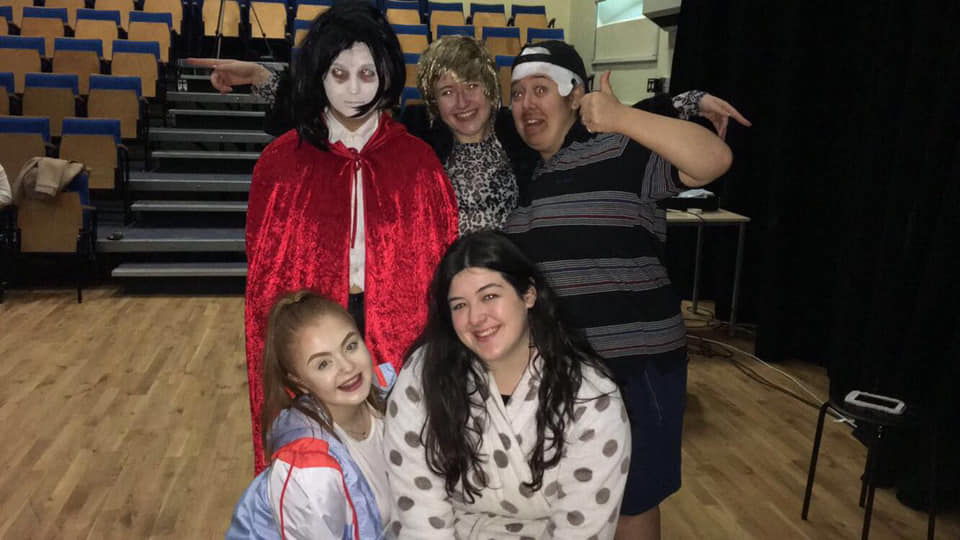
The phrase ‘motley crew’ means a diverse and poorly organized group, which in my opinion could not have been a more perfect way to describe our surrealist comedy. I co-wrote and performed in The Motley Crew with Grace Crilly, Jasmine Towse, Olivia Sutcliffe, and Bridie Hadfield. We created the piece for our Funny Words module in our 2nd year at university.
This performance was a weird and wacky sketch-like response to BBC’s The Young Ones (1984) basing as our main stimulus. The show took an insight into the lives of five very unique university students, who all share an unlikely friendship, under the circumstance of living together in a student accommodation. Characters include: an exchange student from Australia, A 35-year-old Yorkshire man who struggles to let go of his youth and his southern girlfriend, Phillipe Victor the Third a Transylvanian exchange student ‘vampire’ who claims he is not, in fact, a vampire (played by myself), and an average young-adult who resembles the voice of reason. The play included slapstick gags, wit and surreal jokes to explore stereotypes in which we mocked and exploited the humor surrounding them.
Creating The Motley Crew taught me a lot about constructing comedy, particularly creating a successful parody. Taking inspirations from sitcoms such as Friends, How I Met Your Mother and the work of Reeves and Mortimer helped us in the creative process, as we learned what works comically, and also how to build strong, believable relationships between characters. The normative assumptions of ‘student life’ were disrupted by unconventional characters in which we discussed and improvised experiences from our own lives or stories we had been told and found hilarious; for example, having a Halloween party, or blaming other flatmates who have eaten their food out the communal fridge in which we hyperbolized these scenarios by adding ridiculousness gags. We then began writing the script, finalizing which two characters would argue, or which combination of characters would find this hilarious, etc. We received feedback weekly in the run-up to the performance as we performed scenes to see what received the best reception, and which jokes the audience did not understand. This worked for our cast, but I acknowledge that this way of devising comedy may not work with future casts. If I was to work on The Motley Crew again with a different cast, I would still have the collaborative aspect of adapting anecdotes into scenes to still make the piece relatable, but be more precise and disciplined when improvising, although the creative process is at times unconventional, it must be noted that as a group we worked brilliantly and had a hilarious time doing so.
Writing comedy can always be challenging due to the nature that comedy is subjective, but working collaboratively benefited the piece massively, as once we established the direction of a scene, we could all experiment with wording, each focusing on one character and their dynamic with another. We could ‘test’ jokes, puns and innuendos out-loud with each other to hear how they would be said with correct comedic timing. All the previous times I have written scripts, I have just worked individually so working with four other members increased our chance of acquiring the full potential out of wordplay. Co-directing along with my cast similarly allowed me to make artistic choices that I may not have taken on my own which benefitted in our favor.
If I was allowed to co-write and reimagine The Motley Crew, I would adapt the play to screen. The stereotypes have the potential to be taken further, with further freedom of set, makeup and sound, costuming, props, and other aspects that can shock and surprise the audience further due to the fast-paced nature of television, and pre-recording scenes. Our play felt like a TV pilot, which can progressively get more absurd and ridiculous further down the series, and I would adore the opportunity to transform any piece of theatre that was successful for live audiences into screen-play.